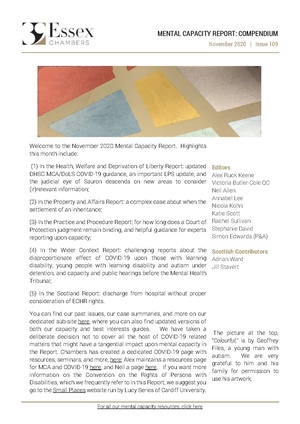Information for "AR v West London NHS Trust (2020) UKUT 273 (AAC)"
Basic information
| Display title | AR v West London NHS Trust [2020] UKUT 273 (AAC) |
| Default sort key | AR v West London NHS Trust (2020) UKUT 273 (AAC) |
| Page length (in bytes) | 8,120 |
| Page ID | 11103 |
| Page content language | en - English |
| Page content model | wikitext |
| Indexing by robots | Allowed |
| Number of redirects to this page | 1 |
| Counted as a content page | Yes |
| Page image |  |
Page protection
| Edit | Allow only users with "editing" permission (infinite) |
| Move | Allow only users with "editing" permission (infinite) |
Edit history
| Page creator | Jonathan (talk | contribs) |
| Date of page creation | 22:47, 29 September 2020 |
| Latest editor | Jonathan (talk | contribs) |
| Date of latest edit | 12:03, 8 October 2021 |
| Total number of edits | 23 |
| Total number of distinct authors | 1 |
| Recent number of edits (within past 90 days) | 0 |
| Recent number of distinct authors | 0 |
Page properties
SEO properties
Description | Content |
Article description: (description)This attribute controls the content of the description and og:description elements. | (1) The four factors set out in AH which must be considered in any application for a public hearing under Tribunal rule 38 are merely factors relevant to the ultimate test of whether a public hearing is in the interests of justice. The first factor ("whether it is consistent with the subjective and informed wishes of the patient (assuming that he is competent to make an informed choice") does not mean that a patient must have capacity in order to be allowed a public hearing, although the wisdom of the patient's wishes is relevant to the application of rule 38. (2) The relevant "matter" for the purposes of assessing capacity is not merely the public hearing application but conduct of the proceedings generally, although lack of capacity in relation to the former entails lack of capacity in relation to the latter. (3) The First-tier Tribunal had restricted its capacity assessment to the decision to apply for a public hearing, and had concluded that "[w]ithout being able to make an informed choice [the patient] cannot have a public hearing", so had erred in relation to both points. |